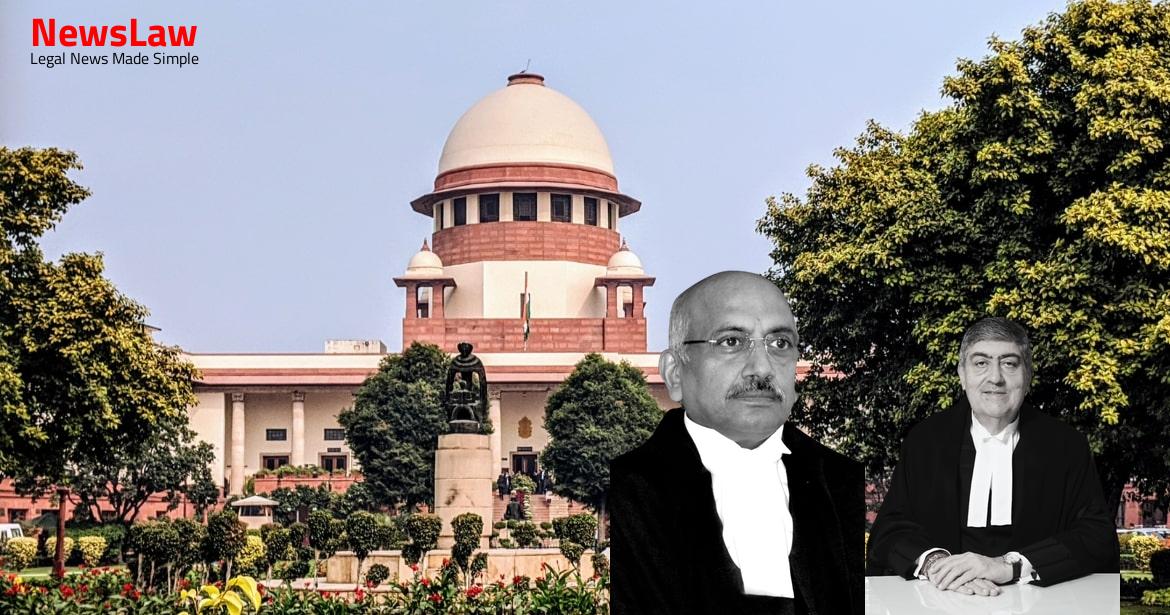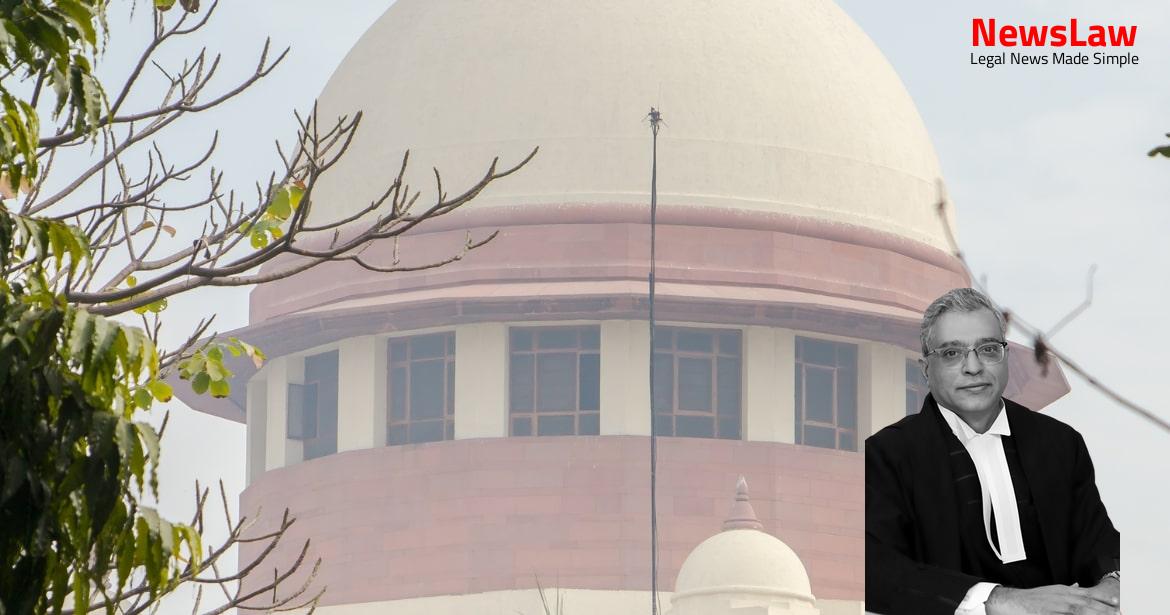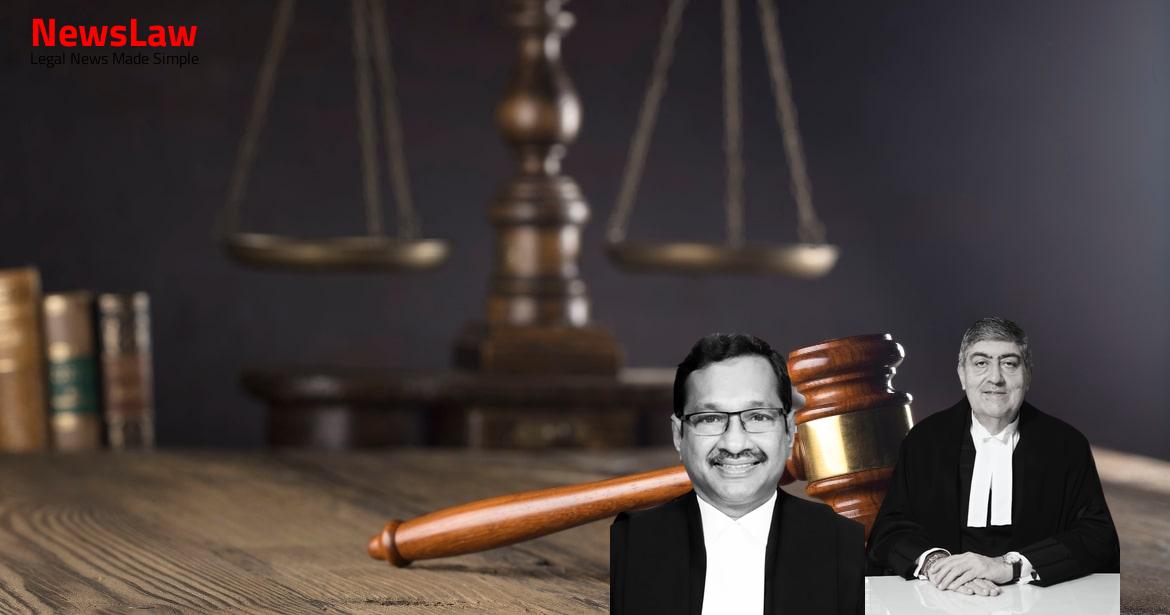In the case of Sukhpal v. NCT Of Delhi, the Supreme Court reaffirmed the conviction of Sukhpal for the murder of Usha. The court meticulously examined the evidence presented by the prosecution, including the confession note and witness testimonies, establishing a strong chain of incriminating circumstances. This landmark judgement ensures justice is served for the victim, Usha, bringing closure to a long-standing legal battle.
Facts
- Accused appellant was married to Usha and had three children.
- Trial Court held confession note as strong evidence against the accused.
- Confession note was found to be in the handwriting of the accused by a handwriting expert.
- Accused appellant was convicted under Section 302 of IPC and sentenced to life imprisonment.
- Prosecution established accused was with the deceased on the night of the murder.
- Non-examination of complainant was deemed beyond prosecution’s control.
- Accused challenged the conviction through this appeal by special leave.
- Confession note was considered an admission and incriminating evidence by the trial court.
- Deceased was found murdered on the night of 19th-20th May, 1990.
- Accused was said to have absconded to evade justice.
- Ashok Kumar Pathak noticed Sukhpal visiting Usha on his cycle in the evening prior to the incident.
- Sukhpal and Usha had a history of quarrels, leading to Sukhpal leaving his wife and children to reside in another village.
- Suspicion of infidelity on Usha’s part often fueled their disputes.
- A confession letter/note was found at the crime scene below the cot where Usha’s body was discovered.
- The accused appellant was charged with the offence based on the prosecution’s case and evidence gathered.
- Ashok Kumar Pathak, though not present in the trial initially, provided a detailed account of the events he witnessed in his deposition.
- The police collected various pieces of evidence including tablets strips, a confession note, and specimen handwritings for analysis.
- The accused fled the crime scene, leading to a suspicion of his involvement in Usha’s death.
- Handwriting analysis by an expert suggested that the confession note found at the crime scene matched the accused’s handwriting.
- The police and prosecution gathered witness statements, documentation, and conducted investigations to build the case against the accused.
Also Read: State of Madhya Pradesh v. Sunita Devi: Upholding Justice Against Arbitrary State Actions
Arguments
- (i) The trial Court and the High Court made a factual error in holding that complainant Ashok Kumar Pathak was examined on oath in proceedings under Section 299 CrPC, whereas his statement was recorded by the SHO under Section 161 CrPC.
- (ii) The confession note was alleged to be fabricated evidence.
- (iii) Material prosecution witnesses admitted that the deceased Usha was involved in sex trade, raising suspicion on other individuals such as Sandeep Kumar and Rajbir Singh, but proper investigations were not conducted.
- (iv) The chain of incriminating circumstances must be established conclusively to prove the guilt of the accused.
- (v) Doubts were raised regarding the process of collecting certain documents by the Investigating Officer.
- (vi) The handwriting expert’s report and testimony were deemed unreliable as the comparison with admitted writings was not done properly.
- (vii) The claim of the prosecution that the accused was absconding was challenged with the argument that he was residing in his village as mentioned in the FIR.
- Usha’s sister Sudha testified that the appellant often quarreled with Usha suspecting her infidelity, indicating a motive for the crime.
- A fight between the appellant and Usha occurred just four days before the incident, further supporting the motive.
- The appellant’s counsel argued that the complainant’s statement was not recorded on oath under Section 299 of CrPC, but this claim was found to be inaccurate.
- Section 299 of CrPC allows for the court to record evidence in the absence of the accused under specific conditions of abscondence.
- The court must ensure strict compliance with the conditions of Section 299 before utilizing witness statements as evidence post-arrest of the accused.
- The prolonged abscondence of the accused was the reason for Ashok Kumar Pathak not being examined, as he was a key witness.
- The appellant’s counsel’s submission that Usha and the accused were divorced lacked evidence and was based only on a statement in a confession note.
- The prosecution proved the case against the accused through compelling circumstantial evidence, including the accused’s presence with Usha on the night of the murder and subsequent abscondence.
Also Read: High Court of Calcutta’s Ruling on English Bazar Municipality vs Neighbor Dispute
Analysis
- The accused Sukhpal and the deceased wife were the only individuals present in the house when the crime took place, invoking Section 106 of the Indian Evidence Act.
- The accused was absconding for nearly 10 years after the murder, leaving his wife and children behind.
- The confessional note and handwriting samples collected from the crime scene were matched by a handwriting expert, indicating the accused’s involvement.
- Ashok Kumar Pathak’s statement under Section 299 CrPC was deemed fit as substantive evidence by the trial court and the High Court.
- The motive, last seen together, confession note, and abscondence of the accused were all testified by Ashok Kumar Pathak, connecting the accused to the crime.
- The prosecution successfully established a chain of incriminating circumstantial evidence pointing to the guilt of the accused appellant.
- The trial Court and the High Court both convicted the accused appellant for the murder of Usha.
- The Court confirmed the view taken by the trial Court and the High Court in convicting the accused appellant.
- There was no hesitation in affirming the conviction of the accused appellant for the charge of committing murder of Usha.
Decision
- The impugned judgments do not have any issues warranting interference
- The appeal has been dismissed
- The appellant is currently out on bail
- If the appellant does not surrender within the specified period, the trial court will take steps to apprehend him
- Pending applications have been disposed of
- The appellant’s bail bonds are cancelled
- The appellant must surrender before the trial court within the next 60 days to serve the remaining sentence
Case Title: SUKHPAL SINGH Vs. NCT OF DELHI (2024 INSC 385)
Case Number: Crl.A. No.-000055-000055 – 2015



